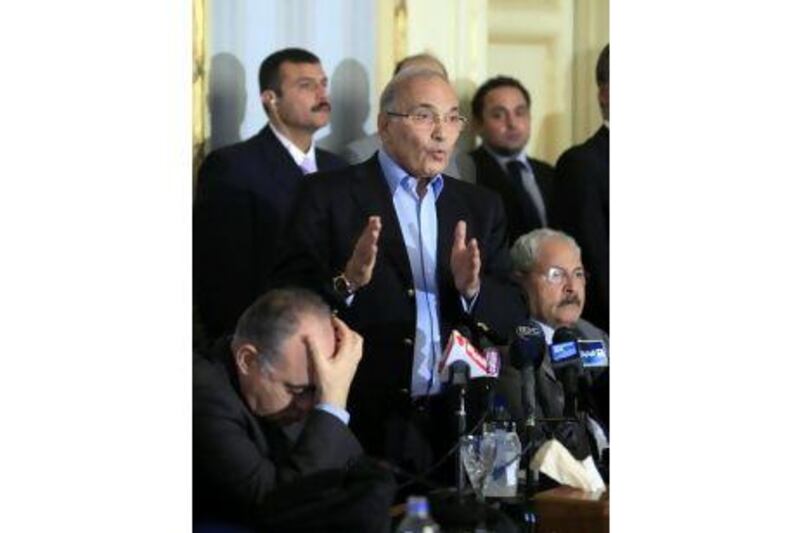CAIRO // Egypt's prime minister resigned yesterday - the army announced the move on Facebook - and was replaced with a politician who had become harshly critical of Hosni Mubarak, the former president.
The departure of Ahmed Shafiq, whom Mr Mubarak appointed on January 29 in the twilight of his presidency, marked the latest effort by Egypt's new military government to appease youth protesters who have held sustained demonstrations in Cairo's Tahrir Square.
Military leaders had originally resisted protesters' demands that Mr Shafiq leave immediately because of his links to Mr Mubarak.
But in a one-sentence statement on its Facebook page, the Supreme Council of the Armed Forces yesterday said it had "decided to accept the resignation of Prime Minister Ahmed Shafiq and to replace him with Dr Essam Sharaf in the formation of the new ministry".
Dr Sharaf served as minister of transport from 2004 to 2006 under Mr Mubarak, then became a vocal critic of the regime and resigned his post in 2006 after complaining of corruption in the government. Mr Sharaf had become increasingly critical of the Mubarak regime in recent years. In early February he publicly called for Mr Mubarak's resignation, even as other government officials and pundits said Mr Mubarak should remain in his post through September. He even helped lead protests on February 4, according to a report yesterday in Al Ahram, the state-owned newspaper.
Mr Shafiq, in a terse statement to Egyptian newspapers after the military's announcement of his resignation, said he had decided he could not remain in his post in the face of continuing protests.
Protesters reacted exuberantly to the news but still vowed to bring tens of thousands to the square today. Loai Moustapha, a 20-year-old student, protested in Tahrir Sqaure from late Wednesday night until 7am yesterday and planned to go back again last night.
"There's good evidence that the high military council is really listening - maybe they felt our pressure," he said. But "we will not accept any compromises, we spent 30 years waiting under an unfair regime that humiliated us."
Mr Moustapha and other youth protesters said their demands include: reform of the country's police forces, the release of youths detained during the protests, the dismissal of the editors of state newspapers and greater inclusion of civilians in the military-led government.
In the three weeks since Mr Mubarak resigned, the Supreme Council of the Armed Forces has suspended the country's unpopular parliament, met frequently with youth leaders, replaced some members of the cabinet and moved to investigate former government officials on corruption charges.
The military's statement yesterday did not offer details on whether other ministers appointed by Mr Mubarak, including Mahmoud Wagdy, the interior minister, and Ahmed Abdoul Gheit, the foreign minister, would also be replaced. Protesters have demanded the immediate dismissal of both men.
Opposition groups including the Muslim Brotherhood, Egypt's Islamist opposition group, welcomed Mr Sharaf's return.
The new prime minister is "known to have a good reputation", the Brotherhood said in a statement, adding it "is eager to see how Sharaf will perform and respond to the demands of the people".
Several thousand protesters yesterday gathered in Tahrir Square and expanded a tent city they have re-estabilished in the grassy median. A separate group of roughly a dozen sat in the middle of a major thoroughfare nearby and blocked traffic for much of the afternoon.
Angry motorists asked them to move, but police and soldiers declined to intervene and directed traffic down narrow side streets.
Military leaders also issued a public apology after a short-lived attempt to take a harder line last Friday, when soldiers cleared Tahrir Square with force.
In spite of the concessions, youth protesters continue to press the advantage to demand a full-scale transformation of Egypt's political system. The Youth for Justice and Freedom, a major protest group, will attend today's demonstrations, but the group had not been affiliated with rallies in the square that blocked traffic this week, said Yasser el Hawary, the group's spokesman.
"This is a very good message from the military, and we want to hear more good news from them," he said. "The rally in Tahrir Square tomorrow will go on as planned, and we will be there to press the next demands."





